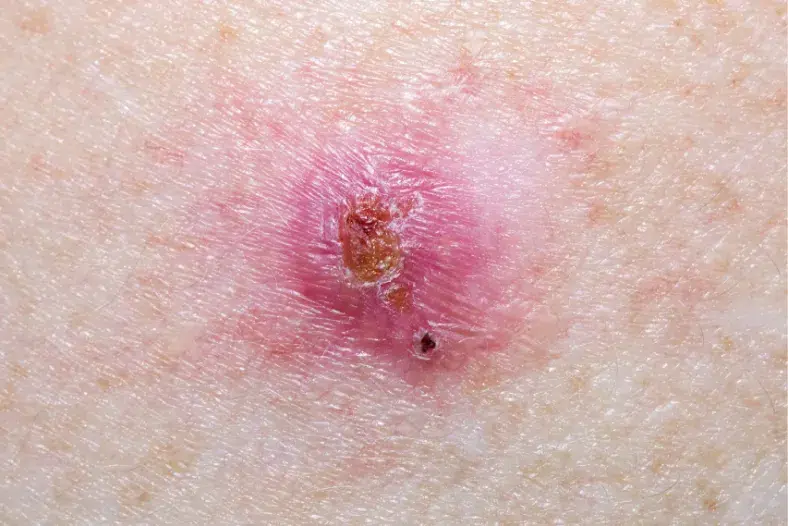More than four million cases of basal cell carcinoma (BCC) are diagnosed in the US each year. The experts at Elite Dermatology & Plastic Surgery are exceptionally qualified to diagnose and treat basal cell carcinoma. We offer multiple skin cancer treatment options at our six practice locations throughout the greater Houston area, and we are meticulous in tailoring each patient’s care strategy to their unique needs.
What Is Basal Cell Carcinoma?
BCC is the most common type of skin cancer. Although basal cell carcinomas rarely metastasize, they can be locally destructive. The lesion enlarges slowly over time and sometimes spontaneously bleeds or ulcerates. There are many clinical and histological subtypes of basal cell carcinomas. Treatment may vary depending on the subtype.
How Is a Basal Cell Carcinoma Diagnosed?
Most basal cell carcinomas are diagnosed through a routine skin check. The diagnosis is then confirmed with a skin biopsy.
The board-certified dermatologists at Elite Dermatology & Plastic Surgery recommend annual skin cancer screenings, as early detection of basal cell carcinoma correlates with higher treatment success rates.

Am I at Risk for Basal Cell Carcinoma?
Male and female patients are at equal risk for basal cell carcinoma. Although fair-skinned persons who are middle-aged or elderly have the highest risk, anyone of any ethnic background, any skin color, and even young persons can develop this type of skin cancer. Intermittent intense sun exposure, family or personal history of skin cancer, radiation exposure, and immunosuppression are all additional risk factors.
When Should I Seek Medical Care?
Early diagnosis of BCCs is important to avoid extensive surgical procedures for removal, thus routine skin checks are advised. Additionally, if you develop a new lesion that bleeds easily or does not heal, you should make an appointment with a dermatologist.
Basal Cell Carcinoma Treatment Options
Treatment options for BCC include surgical and non-surgical procedures. Based on the location of the lesion, its depth, and the subtype of cancer, our skin cancer specialists may recommend curettage and electrodesiccation, cryotherapy, a topical cream, Image-Guided Superficial Radiation Therapy (IG-SRT), or Mohs surgery.
At Elite Dermatology & Plastic Surgery, Mohs surgery and Image-Guided SRT are two of the most recommended treatments for BCC. While these procedures differ significantly, both are associated with cure rates of up to 99% for basal cell carcinoma.
- Mohs surgery – Mohs surgery for basal cell carcinoma is a precise surgical technique where thin layers of cancer-containing skin are progressively removed and examined until only cancer-free tissue remains. Compared to traditional surgical excision, Mohs surgery maximizes healthy tissue preservation, making it a good option for lesions in sensitive or high-risk areas.
- IG-SRT – Image-Guided SRT for basal cell carcinoma is a non-invasive treatment for basal cell carcinoma that uses low-energy X-rays to target and destroy cancer cells while sparing surrounding healthy tissue. It incorporates imaging technology to precisely guide and monitor the treatment, ensuring accuracy and complete removal of the lesion.
Schedule an Appointment
Elite Dermatology & Plastic Surgery offers skin cancer screening services as well as a comprehensive selection of basal cell carcinoma treatment options. If you have concerns about your skin or would like to schedule a skin cancer screening, contact us at one of our six conveniently located offices throughout the greater Houston area. Our team is proud to serve the communities of Heights, Vintage Park, River Oaks, Fulshear, Kingwood, and Pearland.
Frequently Asked Questions About Basal Cell Carcinoma
Can a basal cell carcinoma spread to other parts of the body?
Basal cell carcinomas rarely spread (metastasize) to other organs, but without appropriate and timely intervention, they can be locally invasive and cause significant damage. If left untreated, BCCs can grow deeply into surrounding tissues, potentially affecting nerves, bones, and vital organs.
What causes basal cell carcinoma?
Chronic exposure to ultraviolet (UV) radiation from the sun or tanning beds is the primary cause of basal cell carcinoma. Genetic factors and previous radiation therapy also increase the risk of developing BCC.
Are there warning signs to look out for with basal cell carcinoma?
BCC often appears as a shiny bump, a persistent red patch, a sore that doesn’t heal, or a scar-like area with a waxy appearance. Lesions that bleed, crust, or itch without healing may also indicate BCC.

Does having basal cell carcinoma once increase my risk for future skin cancers?
Yes, individuals who have had BCC are at a higher risk of developing additional skin cancers. Regular follow-ups with your dermatologist at Elite Dermatology & Plastic Surgery are essential for ongoing skin health.
Can basal cell carcinoma be treated without surgery?
Yes, many BCCs can be treated non-surgically with Image-Guided SRT. However, treatment recommendations depend on the lesion’s characteristics, including its size and location. Our board-certified dermatologists are highly qualified to determine if skin cancer treatment with Image-Guided SRT is the ideal treatment option for you.
Is a basal cell carcinoma painful?
In many cases, basal cell carcinomas are painless, but they may bleed and can become tender and/or itchy. Some lesions may cause discomfort or pain if they grow large or become ulcerated.
How can I protect my skin to prevent basal cell carcinoma?
Our basal cell carcinoma prevention tips include:
- Use sunscreen with a high SPF.
- Wear clothing that shields the skin from the sun.
- Avoid spending significant time outdoors during peak sunlight hours to reduce UV exposure.
- Regularly examine your skin for new or changing lesions.
- See a dermatologist for an annual skin cancer screening.

